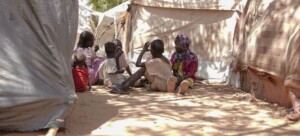ICL: Only 2% of COVID-19 deaths recorded in Khartoum
The Sudanese Minister of Health, Osama Abdelrahim, reported a significant increase in the number of COVID-19 infections this week, bringing Sudan to rank 102 in world prevalence rates.
 Press conference at the Ministry of Health (SUNA)
Press conference at the Ministry of Health (SUNA)
A report from the Imperial College London (ICL) COVID-19 Response Team in collaboration with multiple partners, revealed on Tuesday that an estimated two per cent of COVID-19 deaths have been reported in Khartoum, while the Sudanese Minister of Health reported a significant increase in the number of COVID-19 infections this week.
As a result of the lack of recording, the ICL estimates that around 16,090 deaths may have been missed as of November 20.
In a joint press conference with the Minister of Finance at the Sudan News Agency (SUNA) yesterday, acting Health Minister Osama Abdelrahim said that the majority of cases is in Khartoum and El Gezira, and that 60 per cent of the cases during the first wave were concentrated in Khartoum, while North Darfur had the highest number of deaths. Sudan now ranks 102 in world prevalence rates of the virus.
The minister said that the health system has “taken great blows over the past 16 years,” explaining that their strategy to combat the virus is based on “providing oxygen and increasing laboratories.”
The ICL team projects that the second wave of COVID-19 infections will be “similar in size to the first wave sustained in the summer, if transmission is maintained at current levels.”
Medicine subsidy
The government has decided to subsidise medicines by 60 per cent, which is the largest financial support it has provided in its history, Abdelrahim said.
He explained that the Ministry of Finance issued a letter of guarantee for $8.4 billion, funded from the Strategic Commodities Portfolio, of which $60 million will be used for the subsidy of medicines.
Minister of Finance Heba Mohamed warned of the dangerous economic effects of the COVID-19 pandemic on the economy, indicating that the country lost 40 per cent of its resources due to the first wave of the pandemic. She explained that her ministry gives the coronavirus pandemic the highest priority.
She said in the press conference that the Ministry of Finance has committed to financing the Ministry of Health’s “comprehensive plan to ward off the effects of the pandemic,” with a budget of SDG4.8 billion* within four months, while the state will provide SDG11 billion to the entire health sector during the current year.
Donors have provided $40 million to confront the second wave of the pandemic, said the minister.
Mohamed further reported that a committee of finance, federal health, and health officials in Khartoum and members of the private sector has been formed to ensure the effective use of resources. She called for allocating part of the financial support to provide life-saving medicines during the second wave of the virus.
Recorded cases
The number of registered COVID-19 cases in Sudan since the beginning of the pandemic reached 18,535 cases on December 1, the Health Ministry reported yesterday. Khartoum recorded 14,025 cases, El Gezira 1,446, the two northern states 914, and Red Sea state 488. Central Darfur recorded only six coronavirus infections.
Montasir Osman, deputy head of the Health Emergency and Epidemiology Department of the Health Ministry said at the SUNA press conference yesterday that the available medical supplies and diagnostic laboratory aids are sufficient, and there is more on the way to the country, with the support of the government, organisations, partners, and other countries.
He indicated that the expansion is taking place daily with the aim of increasing the clinical capacity and operating 51 COVID-19 isolation centres in the country.
* USD 1 = SDG 55.1375 at the time of posting, according to the daily middle US Dollar rate quoted by the CBoS. Effective foreign exchange rates however can vary widely on Sudan’s parallel market, where the greenback is currently selling for more than SDG 255.
Radio Dabanga’s editorial independence means that we can continue to provide factual updates about political developments to Sudanese and international actors, educate people about how to avoid outbreaks of infectious diseases, and provide a window to the world for those in all corners of Sudan. Support Radio Dabanga for as little as €2.50, the equivalent of a cup of coffee.












 and then
and then